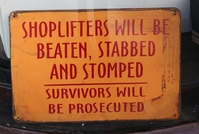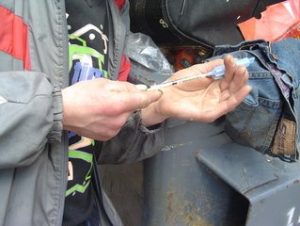 Clients that are charged with Retail Theft frequently call me a few weeks after they are arrested and tell me that they received a letter from the store’s lawyers demanding money. Sometimes, they receive this letter even if they haven’t been criminally charged for the Shoplifting. They usually have two questions when they receive that letter. The first question is whether this means that if they pay the amount they are asking for will that mean that their case is dismissed? The second question is whether they have to pay the amount they are demanding. I will explain to you what I tell them and what that letter means.
Clients that are charged with Retail Theft frequently call me a few weeks after they are arrested and tell me that they received a letter from the store’s lawyers demanding money. Sometimes, they receive this letter even if they haven’t been criminally charged for the Shoplifting. They usually have two questions when they receive that letter. The first question is whether this means that if they pay the amount they are asking for will that mean that their case is dismissed? The second question is whether they have to pay the amount they are demanding. I will explain to you what I tell them and what that letter means.
When you are arrested and charged with a Retail Theft, or Shoplifting in Illinois, this means that you have violated the criminal law of the State of Illinois. You will be assigned a court date and you will have to go to court to answer to the criminal charges. Under Illinois Law, that same Retail Theft gives the store, known as the retail establishment, the right to sue you in civil court for civil, or money damages. The very last part of the statute which deals with the crime of Retail Theft discusses the civil penalties available to the retail establishment. The amount of money the store’s lawyers can go after you for it is the actual retail value of that you stole, or tried to steal, plus anywhere between $100 and $1,000, plus their attorney fees and any court costs associated with the attempt to collect this civil penalty. You will first find out that the store is trying to do this when you receive a letter from their attorneys informing you that they are seeking the civil penalty against you. That letter will inform you that you need to contact them to discuss payment. You need to understand that this proceeding is completely separate and distinct from the criminal case that you are facing. Paying the amount they are seeking will not halt the legal proceedings in the criminal case. As a matter of fact, the prosecutor handling your criminal case and the civil attorney representing the store for money damages have nothing to do with each other. They are not communicating with each other nor are they working together. Often, payment of the civil penalty is something that an experienced Illinois Retail Theft attorney can use when negotiating with the prosecutor to work out a favorable resolution to your criminal Retail Theft case. Showing a prosecutor proof that you paid the civil penalty can only help convince a prosecutor you have accepted responsibility and are trying to make good for the bad that you did. I have used it many times to help get a good deal for a client charged with Retail Theft. At the very least, it has never harmed the client to come to court with proof that they paid the civil penalty. It’s important to know that the statute provides that payment of the civil penalty cannot be used against you in the criminal case to prove that you admitted responsibility or confessed to the crime. From my experience, if you are unable to pay the full amount that the store is demanding, if you contact their attorneys representing the retail establishment, they will work out reasonable payment plans.
What happens if you do not make the payment? First, you cannot go to jail for not making the civil penalty payment. Technically, the store has a right to file a lawsuit against you. But this rarely happens. That’s because the amount owed isn’t worth the expense to the store and their attorneys of filing a lawsuit against you. What frequently happens if you don’t make the payment is that they will turn over the claim to a collection agency. The collection agency will come after you just like any other collection agency would for any other type of debt owed. They may put this on your credit report and make annoying phone calls to your home and work to try to get you to pay.
 Chicago Criminal Lawyer Blog
Chicago Criminal Lawyer Blog


 Last week, Kane County State’s Attorney, Joe McMahon, reported that Kane County Prosecutors have seen a rise in the number of criminal cases filed in Kane County in the first six months of this year compared to last year. McMahon reports that felony filings are up 15.7% compared to the same period last year. The increase in criminal cases in Kane County is happening with misdemeanor and traffic cases as well. In the first six months of 2017, 1,247 new felony cases were filed. During the same period last year, 1,078 cases were filed. Aurora, the largest city in Kane County, has seen a drop in the number of new felony cases. Most criminal cases in Kane County come from Aurora. The Village of Carpentersville has seen a rise in the number of Retail Theft cases. Carpentersville police attribute this to the opening of a new Walmart in Carpentersville. Elgin, the second largest city in Kane County, has seen a rise in violent crimes. McMahon is concerned with the increase in the number of criminal cases filed in Kane County since the number of criminal cases filed increased in 2016 as well.
Last week, Kane County State’s Attorney, Joe McMahon, reported that Kane County Prosecutors have seen a rise in the number of criminal cases filed in Kane County in the first six months of this year compared to last year. McMahon reports that felony filings are up 15.7% compared to the same period last year. The increase in criminal cases in Kane County is happening with misdemeanor and traffic cases as well. In the first six months of 2017, 1,247 new felony cases were filed. During the same period last year, 1,078 cases were filed. Aurora, the largest city in Kane County, has seen a drop in the number of new felony cases. Most criminal cases in Kane County come from Aurora. The Village of Carpentersville has seen a rise in the number of Retail Theft cases. Carpentersville police attribute this to the opening of a new Walmart in Carpentersville. Elgin, the second largest city in Kane County, has seen a rise in violent crimes. McMahon is concerned with the increase in the number of criminal cases filed in Kane County since the number of criminal cases filed increased in 2016 as well. This is one of the more common questions that I get asked when people call me wanting advice about how to deal with a situation like this. Many people think that as long as it’s not the police asking questions, they have nothing to worry about. Nothing can be further from the truth. If your employer is suspecting that you stole something and they want you to come in to the office to discuss the matter, you need to be aware of how dangerous this situation can be. This situation can be more dangerous than talking to the police. Let me explain why.
This is one of the more common questions that I get asked when people call me wanting advice about how to deal with a situation like this. Many people think that as long as it’s not the police asking questions, they have nothing to worry about. Nothing can be further from the truth. If your employer is suspecting that you stole something and they want you to come in to the office to discuss the matter, you need to be aware of how dangerous this situation can be. This situation can be more dangerous than talking to the police. Let me explain why. This is a very frequent question that I get from people that call me. They want to know how the police can arrest them without any evidence that they did anything wrong. Just because you were arrested by the police and charged with a crime does not mean that you are guilty. An arrest and a criminal charge is just an allegation. The police officer who arrested you, and the prosecutor that charged you with a crime, believe that you did something wrong. Now they must prove you guilty beyond a reasonable doubt in court. There’s several things that you can do to make it more difficult for the police and the prosecutors to prove you guilty in court. Let’s talk about some of the things that you can do to help your case.
This is a very frequent question that I get from people that call me. They want to know how the police can arrest them without any evidence that they did anything wrong. Just because you were arrested by the police and charged with a crime does not mean that you are guilty. An arrest and a criminal charge is just an allegation. The police officer who arrested you, and the prosecutor that charged you with a crime, believe that you did something wrong. Now they must prove you guilty beyond a reasonable doubt in court. There’s several things that you can do to make it more difficult for the police and the prosecutors to prove you guilty in court. Let’s talk about some of the things that you can do to help your case. Cook County State’s Attorney, Kim Foxx, has announced that her office will stop prosecuting cases involving people charged with driving on a suspended or revoked driver’s license based on a financial reason, such as failure to pay parking tickets. tolls or child support. The decision to do this is based on a lack of funding for the State’s Attorney’s Office which has left the office with not enough prosecutors to handle the criminal prosecutions in Cook County. This does not mean that these cases will go away in Cook County. Individual towns, cities and villages will be allowed to prosecute these cases themselves. This could mean a rise in the number of cases being charged as Municipal Violations. Each city, town, and village can set up their own administrative process which involves Hearing Officers and attorneys hired by the towns and Villages, that collect fines for violations. The standard of proof in a Municipal Ordinance Violation case is much lower than in a criminal case and the potential punishment is a monetary fine and not jail time.
Cook County State’s Attorney, Kim Foxx, has announced that her office will stop prosecuting cases involving people charged with driving on a suspended or revoked driver’s license based on a financial reason, such as failure to pay parking tickets. tolls or child support. The decision to do this is based on a lack of funding for the State’s Attorney’s Office which has left the office with not enough prosecutors to handle the criminal prosecutions in Cook County. This does not mean that these cases will go away in Cook County. Individual towns, cities and villages will be allowed to prosecute these cases themselves. This could mean a rise in the number of cases being charged as Municipal Violations. Each city, town, and village can set up their own administrative process which involves Hearing Officers and attorneys hired by the towns and Villages, that collect fines for violations. The standard of proof in a Municipal Ordinance Violation case is much lower than in a criminal case and the potential punishment is a monetary fine and not jail time. Retail Theft, commonly known as Shoplifting, is a very serious crime in Illinois. In addition to the criminal penalties associated with a Retail Theft case, a prospective employer that finds a Retail Theft case in a background search could use it against you to deny you employment. Some employers conduct background searches. If your current employer finds out about a Retail Theft arrest, your employer may fire you. If you try to lease an apartment and a landlord conducts a background search, that landlord may turn down your lease application.
Retail Theft, commonly known as Shoplifting, is a very serious crime in Illinois. In addition to the criminal penalties associated with a Retail Theft case, a prospective employer that finds a Retail Theft case in a background search could use it against you to deny you employment. Some employers conduct background searches. If your current employer finds out about a Retail Theft arrest, your employer may fire you. If you try to lease an apartment and a landlord conducts a background search, that landlord may turn down your lease application. Just like State laws create State crimes, and Federal laws create Federal crimes, individual towns, cities and villages also create laws, called Municipal Ordinances, which can give rise to charges alleging a violation of a Municipal Ordinance. I’ve been handling criminal cases for the past 27 years throughout Cook County, DuPage County, Kane County, and Lake County. I’ve noticed a dramatic rise in the number of Municipal Ordinance Violation cases throughout all of these counties. Many cities, towns and villages have established their own Municipal Violation Ordinance Courts which mainly impose monetary civil penalties upon violators that have become big sources of revenue for these municipalities. I’m seeing more and more cases being charged as Municipal Ordinance Violations rather than criminal cases in Circuit Court. This is especially true in Chicago, DuPage County, Kane County, and Lake County. I see the number of Municipal Ordinanve Violation cases increasing in the future
Just like State laws create State crimes, and Federal laws create Federal crimes, individual towns, cities and villages also create laws, called Municipal Ordinances, which can give rise to charges alleging a violation of a Municipal Ordinance. I’ve been handling criminal cases for the past 27 years throughout Cook County, DuPage County, Kane County, and Lake County. I’ve noticed a dramatic rise in the number of Municipal Ordinance Violation cases throughout all of these counties. Many cities, towns and villages have established their own Municipal Violation Ordinance Courts which mainly impose monetary civil penalties upon violators that have become big sources of revenue for these municipalities. I’m seeing more and more cases being charged as Municipal Ordinance Violations rather than criminal cases in Circuit Court. This is especially true in Chicago, DuPage County, Kane County, and Lake County. I see the number of Municipal Ordinanve Violation cases increasing in the future